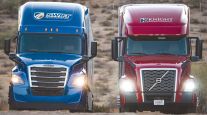Opinion: Trucking Remains a Force for Change
By Greg Fulton
President
Colorado Motor Carriers Association
This Opinion piece appears in the July 15 print edition of Transport Topics. Click here to subscribe today.
It frustrates me when I hear people make statements about trucking and professional truck drivers as being somewhat behind the times or unwilling to change.
The fact is, the trucking industry is one of the most innovative and dynamic sectors in our country, and its companies and professionals have been leaders for change in many areas. Give its people a challenge, and not only will they meet it, they’ll go well beyond the goal.
We are problem solvers whose solutions not only have benefited those in our industry but have paved the way for others.
The reality is that our companies, drivers, mechanics and others are not afraid of challenges and don’t make excuses or look for assistance to solve their problems.
Safety, trucking’s primary concern, probably best reflects the culture of change and improvement. Over the years, the industry has actively sought ways to reduce accidents and make our highways safer, whether it be through better standards and enforcement, new technologies, or improved safety and training programs.
Trucking had a drug-and-alcohol testing requirement in place well before other industries — including professional sports.
Our industry was one of the first to conduct extensive employment and background checks on drivers. Regarding fatigue, trucking has backed research on rest and science-supported rules on driving hours. No other industry, with the possible exception of the airlines, has conducted as much research or placed as much emphasis on this area.
In regard to safety technologies and equipment, new truck braking systems have reduced the stopping distance of a tractor-trailer by 30%, and many trucks are equipped with anti-rollover technology. The result has been continued improvement in safety, with the accident rate dropping dramatically over the past 20 years.
Then there’s the environment: With rising concerns in our country, the industry accepted tougher engine standards and successfully migrated to ultra-low-sulfur fuels.
As proof of the industry’s commitment to improving air quality, a 2010 truck generates 98% less nitrogen oxides and particulate matter emissions than a 1988 model. The 2014 engines will be the first to have greenhouse-gas emissions and fuel-consumption standards, which will result in substantially better fuel efficiency.
Trucking not only has helped to develop the Environmental Protection Agency’s SmartWay program, but the industry has made it one of the most successful voluntary environmental initiatives in the country.
Using SmartWay technologies, many companies have seen improvements in fuel efficiency ranging from 5% to 35%, which translates into less greenhouse gases.
Participants in the SmartWay program have realized fuel savings of more than 65 million barrels of oil since 2004.
In the alternative-fuels area, trucking leads the country in the number of natural gas-powered vehicles and is exploring and testing other clean-burning and more efficient fuels.
As for advances in technology, the use of the Global Positioning System has been evolving over the past five years in the automobile market. Trucking companies have used GPS devices for a number of years. Mercedes touts the collision-avoidance system in some of its new cars, while systems such as VORAD, which warn truck drivers about vehicles in their blind areas, have been around for years.
Systems such as PrePass, which began more than 20 years ago and provide electronic clearance at weigh stations, helped to pave the way for the electronic toll systems used throughout the country.
Fleet communications systems, including electronic on-board recording capabilities, have been installed voluntarily in hundreds of thousands of trucks across the country, ensuring greater compliance with hours-of-service requirements as well as allowing companies to better manage their operations.
Trailers are being equipped with new devices that reduce aerodynamic drag, improving fuel-efficiency.
Finally, there are our people. They are our greatest resource, and they are the major reason our industry has been able to adapt and meet the needs of our rapidly changing country.
Our safe, professional drivers, managers, dispatchers, mechanics and others consistently have met the challenges associated with the ever-changing regulatory environment and the testing and adoption of new technologies.
These people are intelligent, hard-working and constantly seeking ways to improve trucking. Not only have they been the ones to implement change, but in many cases, they have been the innovators for change.
As one friend mentioned to me about our dynamic, changing industry and the high-tech equipment used in it, “We’re not your father’s Peterbilt.”
The Colorado Motor Carriers Association, which includes more than 600 companies involved in the trucking industry, has headquarters in Denver.




